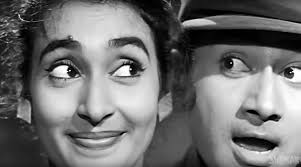What a day is October 1, the birth anniversary of two of the Golden Era of Bollywood music’s most creative and consistent artists. While music director SD Burman, born in 1906, continued to create melodic magic till his death in 1975, the 1919-born lyricist Majrooh Sultanpuri remained active for over five decades, till he passed away in 2000. And the best thing about both these geniuses who shared birthdays was that they combined to create many outstanding songs together.
Over the years, of course, a large chunk of their films featured Dev Anand, examples being ‘Paying Guest’, ‘Nau Do Gyarah’, ‘Kala Pani’, Manzil’, ‘Solva Saal’, ‘Bombai Ka Baboo’, ‘Baat Ek Raat Ki’, ‘Jewel Thief’ and ‘Teen Deviyan’. On the birth anniversary of the two legends, I look at 15 compositions born of their partnership.
Incidentally, the coming together of the two owed much to the break in the partnership of SD Burman and Sahir Ludhianvi. After the success of Pyaasa (1957), Burman and Ludhianvi fought bitterly to gain credit for the success of the music of Guru Dutt's iconic film. Faced with what he believed to be the obstinacy of the lyricist, Burman decided he would never work with Ludhianvi again. Thus began a partnership with Sultanpuri that lasted till Burman's final years.
Besides the Dev Anand films, SD and Majrooh combined on such classics as ‘Chalti Ka Naam Gaadi’ (which had Kishore’s ‘Ek Ladki Bheegi Bhaagi’, the Kishore-Manna Dey song ‘Babu samjho ishaare’ and the Kishore-Asha superhit ‘Haal Kaisa Hai Janaab Ka’) and ‘Sujata’ (which had Talat Mahmood’s unforgettable ‘Jalte Hain Jiske Liye’, Geeta Dutt’s ‘Nanhi kali sone chali’, Asha and Geeta’s ‘Bachpan ke din’ and SD’s own rendition of ‘Sun mere bandhu’). The Lata song ‘Pawan Deewani’ from ‘Dr Vidya’ was a major hit too.
Here I would like to share this information that the first song written by Majrooh and composed by Sd Burman was " Woh Sapne wali Raat sung by Geeta Roy in the film Pyar (1950). After a gap of 7 years, they worked together in Paying Guest (1957).They worked together for more than 15 years, creating some memorable compositions. While there was a difference of 13 years between the two (Burman was born in 1906, Sultanpuri in 1919), they were inextricably linked by a common birthday.
The two of them also worked in films like ‘Lajwanti’, ‘Sitaron Se Aage’, ‘Talaash’, ‘Phagun’ and ‘Sagina’ (remember ‘Saala mein to saahab ban gaya’?) But their biggest hit arguably was in Hrishikesh Mukherjee’s 1973 film ‘Abhimaan’, which had ‘Tere mere milan yeh raina’ (Lata-Kishore), ‘Teri bindiya’ (Lata-Rafi), ‘Lutey koi man’ (Lata-Manhar Udhas), Kishore’s ‘Meet Na Mila’ and three Lata solos ‘Nadiya Kinarey’, ‘Ab Toh Hai Tumse’ and ‘Piya bina’.
Maana Janaab Ne Pukaara Nahin' — Paying Guest (1957)
Song of Paying Guest 1957
Aankhon Mein Kya Ji' — Nau Do Gyarah (1957)
Song of Nau Do Gyarha 1957
Chhod Do Aanchal - Paying Guest (1957)
Song of Paying Guest 1957
Hai Apna Dil To Awara' — Solva Saal (1958)
Song of Solva Saal 1958
Hum Bekhudi Mein — Kala Pani (1958)
Song of Kala Paani 1958
Koi Aaya Dhadkan Kehti Hai' — Lajwanti (1958)
Song of Lajwanti 1958
Accha Ji Main Haari' — Kala Pani (1958)
Song of Kala Paani 1958
Ek Ladki Bheegi Bhaagi Si' — Chalti Ka Naam Gaadi (1958)
Song of Chalti Ka Naam Gaadi (1958)
Jalte Hain Jiske Liye' — Sujata (1960)
Song of Sujata(1960)
Chal Ri Sajni Ab Kya Soche - Bombai Ka Babu
Song of Bombai Ka Baboo (1960)
Pawan Diwane - Dr. Vidya (1962)
Song of Dr. Vidya (1962)
Na Tum Humein Jano
Song of Baat Ek Raat Ki (1962)
Aise To Na Dekho - Teen Deviyan
Song of Teen Deviyan (1965)
Hothon Pe Aisi Baat - Jewel Thief (1967)
Song of Jewel Thief (1967)
Meet Na Mila Re Mun Ka - Abhimaan
Song of Abhimaan (1973)































